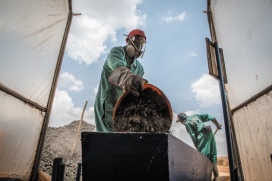 Safely managed sanitation is a focus of the Sustainable Development Goals (SDGs). It is central to stunting reduction and early childhood survival, both identified by the World Bank’s Human Capital Index as critical for humans to develop their full potential. It is widely known that 4.5 billion people lacked access to safely managed sanitation in 2015, according to the Joint Monitoring Programme. Less well understood is that hundreds of millions more people in densely populated rural areas are exposed to significant health risk due to unsafely managed sanitation.
Safely managed sanitation is a focus of the Sustainable Development Goals (SDGs). It is central to stunting reduction and early childhood survival, both identified by the World Bank’s Human Capital Index as critical for humans to develop their full potential. It is widely known that 4.5 billion people lacked access to safely managed sanitation in 2015, according to the Joint Monitoring Programme. Less well understood is that hundreds of millions more people in densely populated rural areas are exposed to significant health risk due to unsafely managed sanitation.
In contrast to urban areas, fecal sludge management (FSM) is not yet recognized as a priority for the rural sanitation sector – it is assumed to be less of an issue because rural areas are more sparsely populated. However, some densely populated areas fall under rural administrations, notably in deltas and on the periphery of rapidly growing rural areas. In these areas there is also a need to safely manage fecal waste. Many sanitation systems that, for lack of scrutiny, are assumed to be improved and safe, but due to lack of scrutiny they fail to safely manage fecal sludge.
A new World Bank report-supported by the Global Water Security and Sanitation Program (GWSP) – and six case studies identified specific causes of health risks in locations in Bangladesh, Bolivia, Egypt, India, and Vietnam. They include compromised construction of on-site sanitation solutions, incorrect technology choices, poorly developed FSM markets, predominantly manual emptying practices and indiscriminate dumping of sludge in the immediate environment. They found that environmental regulations and building codes do not address FSM effectively, and enforcement is often weak. Rural administrations typically lack the mandate and institutional capacity to provide and manage FSM services.
Read the full blog by Joep Verhagen and Pippa Scott
Citation







